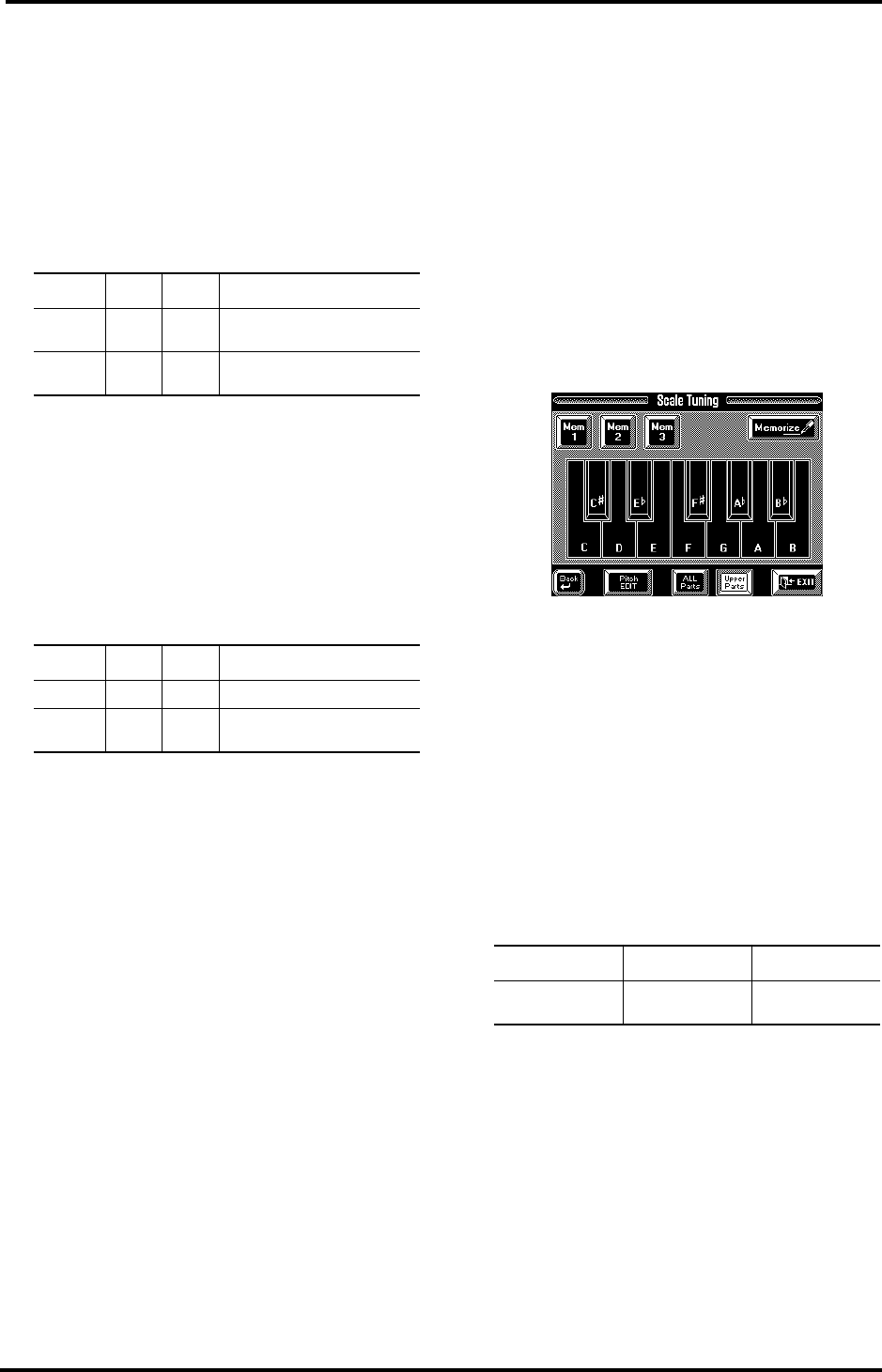
VA-76 Owner’s Manual—Advanced Keyboard part functions
92
Min and Max can be used effectively for switching
between two Tones simply by striking the keys harder
or softer. Doing so allows you to alternate between two
sounds. Remember, though that some “V” Tones
already have this function built-in (see page 42). Using
such Tones for velocity switching applications is thus
unnecessary. But feel free to experiment. Some unique
effects could be obtained when using Min and Max for
the Upper1 and VariPhrase parts.
Consider the following example:
Both parts must be on. The above settings allow you to
trigger the “normal” trumpet sound with velocity val-
ues between 1 and 114 (low to relatively high velocity),
while velocity values above 115 only trigger the
slightly more “lyrical” trumpet (a Tone, by the way,
that contains already a built-in velocity switch for
additional flexibility). Try this out: it sounds spectacu-
larly real.
Another example involving the Upper1 and Vari-
Phrase parts could be:
Here, the Upper1 part sounds all notes at any velocity
value, while the VariPhrase part is added only when
you strike the keys rather forcefully. This could be
used for accents. Of course, there are countless other
possibilities, such as using Min= 90/Max= 127 for the
MEL Int part (see page 99), so that the automatic har-
monies are only added when you really want to hear
them.
Note: See page 37 for how to select Tones for the Keyboard
parts, and page 45 for how to select a VariPhrase.
6.
Press [EXIT] to return to the Master page.
6.5 Scale Tuning
Another useful function is called Scale Tuning. It
allows you to use oriental, asian, and other scales in
much the same way as on an oriental keyboard
(EM-50 OR, etc.).
The VA-76 contains three memories where you can
store your favorite tunings. The contents of these
memories can be saved to disk along with the User
Program Set (see page 211) – i.e. these are three global
memories.
1.
Press the Keyboard Mode [OTHER] button.
2.
If the [KEYBOARD MODE] field in the upper right
corner is not displayed in white, press it.
3.
Press the [Scale Tuning] field.
4.
Press the [Upper Parts] or [All Parts] field.
All Parts means that all VA-76 parts will be affected by
the Scale Tune setting. This also includes the Vari-
Phrase and Arranger Parts. Upper Parts, on the other
hand, means that only Upper1 and Upper2 will use
the selected scale. There is also an off position (when
both fields are blue).
Note: The [Upper Parts] function can also be switched on
and off using an optional footswitch (see page 191).
5.
Press a [Mem 1]~[Mem 3] field to select a Scale
Tuning memory.
This will change the pitch of the following notes
(“–50” means that the note in question is tuned a
quarter tone down):
Part Min Max Tone
Upper1 1 114
A81 <14> V Romantic Trp.
(Tone Map 4)
Upper2 115 127
A81 <17> V Tp Mar/Shk (Tone
Map 4)
Part Min Max Tone
Upper1 1 127 A76 <27> Humming (Map 4)
Vari-
Phrase
90 127 A-Melodic-6 OohDarlin M
Mem 1 Mem 2 Mem 3
E (–50)
B (–50)
E (–50)
A (–50)
C# (–50)
F# (–50)
VA-76.book Page 92 Friday, January 12, 2001 12:35 PM


















